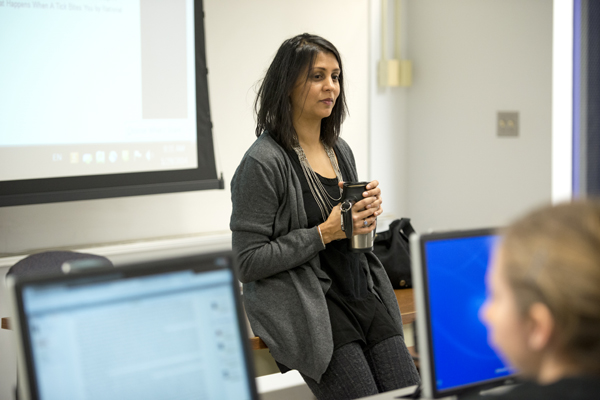

Award-winning journalist Sonia Shah has been named SUNY New Paltz’s 2014 James H. Ottaway Sr. Visiting Professor of Journalism. This spring semester, Shah began teaching a course titled “Science, Environment and Disease: New Approaches to Science Journalism.”
Shah has written extensively on the topics of science and politics and is the author of three books, including “The Fever: How Malaria Has Ruled Humankind for 500,000 Years,” which was the culmination of five years of investigative research and reportage from her time spent in Cameroon, Malawi and Panama.
For Journalism Professor and Head of the Ottaway Search Committee Lisa Phillips, Shah typified an Ottaway professor — a distinguished journalist at a high point in her career that can offer a perspective that students have likely not been exposed to yet.
“We’ve never had a journalist with the particular combination of things she has,” Phillips said about Shah’s unique orientation in both science and human rights.
Her seminar course will focus on Lyme disease. Shah said the class will help her with her research of emerging diseases, a topic that she has spent the last nine months writing about for her upcoming book.
“Lyme disease exemplifies all these changes in society that I think are interesting, like deforestation, spillovers between people and other animals, the facts that we’ve focused on deer as sort of the bad guys. That may or may not be true — the whole vagueness of diagnosis and treatment.” Shah said. “I think all of those things exemplify how confusing and disruptive new disease can be because we don’t understand them very well. It really exposes all the weakness in our society and all the changes that are happening.”
Phillips, who has covered Lyme disease in the past for a neurology orientated publication, said Shah’s decision to make Lyme disease the focal point of the course is both brave and important. — A difficult topic because it will put some of the biggest challenges in journalism to practice.
“People have very strong feelings about it [Lyme disease], and how to get to the facts beyond the feelings is an important part of the journey when covering Lyme disease,” Phillips said.
Philips said that the course will present students with significant questions, such as: what constitutues being an expert, who is a good source and what can be considered a good source of information.
Shah, who graduated from undergraduate studies alongside Phillips from Oberlin College in 1990, has experience teaching copy editing classes and classes for new reporters, as well as giving about a half dozen lectures at colleges every year for the past 10 years. She also gave a TED Talk on Malaria at TEDGlobal in 2013.
“I was really excited to be able to design a course myself,” Shah said. “I also love interacting with college students. I think it’s such an amazing time of life where you’re so open to new ideas and you’re becoming accomplished, but you’re still really open minded and absorbing everything. I find it really rewarding to work with undergraduate students.”
Shah will give a speech and answer questions from President Don Christian on Tuesday, Feb. 4 at 6 p.m. in the Honors Center.
*Additional reporting by Jennifer Newman
